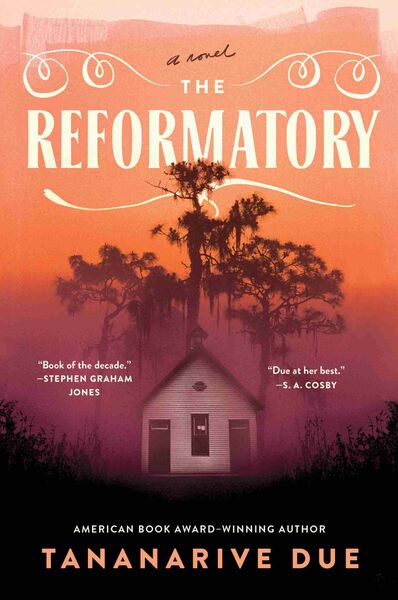Learn the Golden Rule
The Reformatory
By Tananarive Due

8 Nov, 2024
0 comments
Tananarive Due’s 2023 Bram Stoker-winning The Reformatory is, in its way, an example of the venerable boarding school adventure genre. However, as protagonist Robert Stephens is African American and the book is set in Jim-Crow-era Florida, The Reformatory is also a horror novel.
Twelve-year-old Robert Stephens, Jr. is, like all his kin, keenly aware of the danger that his racist white neighbors present. Neverending vigilance and caution are mandated if Robert would like to live to thirteen. Nevertheless, Robert commits an unforgivable transgression: being the son (and namesake) of union-organizer Robert Stephens, Sr.
Robert Stephens, Sr. fled north from a trumped-up rape charge. Robert Stephens, Sr.’s wife is too dead to target. Robert Stephens, Jr., is an ideal target for displaced frustration. Retaliation is a matter of when and how, not if.
A chance encounter dooms Robert.
Lyle McCormack probably thinks of himself as a friend, of sorts, to Robert, Jr. and Robert’s sister Gloria1. Gloria being a pretty girl, her relatives steered her well away from Lyle as soon as she hit puberty. Robert and Gloria encounter Lyle while out walking. The conversation turns sour. Lyle makes a rude comment to Gloria and shoves Robert. Robert kicks Lyle in the knee.
Lyle being white, the kick would be a grave error. Lyle’s father is Red McCormack. Red is rich and extremely well-connected. Therefore, the punishment for the transgression is swift and disproportionate. Robert is arrested and sentenced to six months in the Gracetown School for Boys.
Many are involuntarily inducted into the Gracetown School for Boys. A smaller number live long enough to graduate. To survive, Robert has to keep his head down and follow the rules even when those rules are not clearly explained. If Robert is careful and lucky, he might see freedom again.
Robert isn’t lucky. Robert has a knack for seeing ghosts. The monstrous Warden Haddock has a use for a boy who can see ghosts. The reformatory is overrun with ghosts angry at the warden for having murdered them. Robert is drafted into the warden’s ghost-extermination program.
Robert being known to and valuable to the warden is bad enough. A ghost named Blue is just as determined as Haddock to put Robert to use. Robert could, with a little help from the ghosts, get his hands on evidence of the warden’s horrendous crimes. This would place Robert at tremendous risk. This is a price Blue is willing to pay.
Compounding the above: the authorities would dearly love to get their hands on Robert, Sr. His son is ideal bait, or at least an acceptable proxy for their anger. Gloria’s best efforts cannot secure Robert’s freedom through legal channels. This leaves only illegal methods, such as jailbreak.
The Reformatory excels at tracking down and killing would-be escapees.
~oOo~
A number of very positive reviews are careful to frame this as a story that happened long ago, in a different land, under a long-dead regime. Therefore, the novel’s stern rebuke of an unjust system is entirely acceptable, even admirable, because the system in question has nothing to do with the reviewer’s own circumstances.
I am not entirely convinced that the system in question is long dead; it seems to be thriving, common, and rebranded. Cursory examination suggests that certain groups are disproportionately targeted for legal retaliation, and if this is not done to undermine the political influence of the groups in question while making available to well-connected oligarchs low-cost labourers2, the system seems designed to do so. As economist Dan Davies says “the purpose of a system is what it does.”
Many of the workers at the reformatory are there to indulge their worst impulses. This is not universal. Teacher Mrs. Pournelle3 seems sincere enough. But, as the book makes clear, everyone eventually gets corrupted by the system, regardless of their good intentions or lack thereof.
Cuz when you start working there, Junior said, it turns you into somebody else. Brings out all the worst, buried parts of you.
I kept nudging The Reformatory down the to-read stack because the book is just under six hundred pages and as I have frequently mentioned, my ability to read long books in a single sitting, which is the only way I know how to read books, has diminished.
This caution was entirely misplaced. Due’s characters are engaging. I wasn’t as keen on the sections that follow Gloria, which might have been there to keep readers from asking why Gloria didn’t just turn to means of redress that largely didn’t exist and would not have been allowed to succeed if they did. Robert’s efforts to survive the no-win situation, caught between warden, ghosts, and vengeful oligarchs, is fascinating. I wish I’d read The Reformatory sooner.
The Reformatory is available here (Amazon US), here (Amazon Canada), here (Amazon UK), here (Apple Books), here (Barnes & Noble), here (Chapters-Indigo), and here (Words Worth Books).
1: Getting out of Florida can be tricky for poor black people. You can’t take the train north if you don’t have train fare. It’s almost as though the system is set up to ensure a steady population of vulnerable people.
2: Of course, some might feel that their ethnicity makes them immune to this process. However, it’s not hard to orchestrate mass homelessness, which can then be made illegal, so that a pool of new workers is there to be hired for paltry pay or forced to work for no pay at all.
3: Where do authors get their crazy character names?
